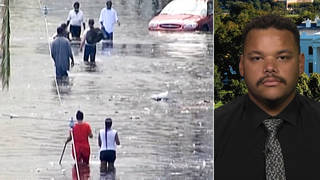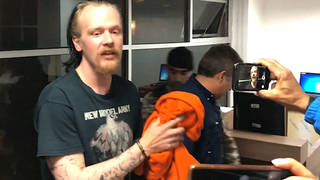
Guests
- Craig Murrayformer British ambassador to Uzbekistan. He was removed from office in 2004 after he exposed how the United States and Britain supported torture by the Uzbek regime.
- Tariq AliBritish-Pakistani author and activist. He is editor of New Left Review and author of many books, including Pirates of the Caribbean: Axis of Hope.
See Craig Murray, the former British ambassador to Uzbekistan, and writer and activist Tariq Ali, speak outside the Ecuadorean embassy, where WikiLeaks’ Julian Assange spoke Sunday. “The invasion of a diplomatic premises is a crime in international law and a crime in the state whose premises are invaded,” says Murray of the United Kingdom’s threat to raid the embassy to arrest Assange. “So any policeman who forcibly enters the premises of the embassy of Ecuador will find himself liable for extradition to Ecuador as soon as he leaves the United Kingdom.” Click here to see all of our WikiLeaks coverage.
CRAIG MURRAY: We should not forget what this is about. This is about the persecution of an individual who has made life much more simple and more productive for whistleblowers in the information age and in an age when, as Western governments become increasingly authoritarian and civil liberties are diminished, we need whistleblowers more than ever to protect the rights of all of us.
We have heard of the areas where WikiLeaks have been active, not only the prosecution of illegal war in Iraq, but the revealing of individual war crimes carried out within that war, the targeting of people for assassination throughout the world and the collusion of governments of different stripes in that targeting for torture and rendition of individuals.
Now consider this. I blew the whistle on torture and extraordinary rendition and the collusion of the CIA and MI6. I was, in consequence, immediately charged with extortion for sexual purposes and blackmailing people into sex in exchange for British visas. It took me one-and-a-half years to clear my name of those charges, because they routinely charge and try to defame and fit up whistleblowers, and that is what is happening to Julian Assange, just as it happened to me.
I shared a platform across the United States with a very brave lady, Brigadier Janis Karpinski, who was the senior woman in the United States Army. She blew the whistle on the fact that she had seen documents signed personally by Donald Rumsfeld authorizing the torture at Abu Ghraib. The very next day, she was charged with shoplifting.
I could name five or six examples straightaway of individual whistleblowers who are always immediately charged with offenses which don’t relate to whistleblowing at all, because in the United States and the United Kingdom and apparently Sweden today, just as used to always happen in authoritarian and totalitarian countries, dissidents are not charged with political offenses, they are fitted up with criminal offenses. That is the state our society has come to.
How likely is it? How likely is it that when I was engaged in a bitter struggle, an internal struggle with my own government, who were trying to sack me over the use of torture, and I was trying to prevent the use of torture, did I then think, “Oh, that’s a good idea. I’ll go and rape someone tomorrow while I’m in the middle of this”? Was Julian Assange, while conducting the campaign of WikiLeaks, so distracted he decided to get into incidental and coincidental criminal activity? Did Donald Rumsfeld get outed as the man who authorized torture by Janis Karpinski just for her to think the very next day she would pop out and do a bit of shoplifting? No. Only our disgustingly complacent and spoon-fed mainstream media would accept such a narrative for one single moment. It is obviously nonsense to anybody with half a brain.
Now then, let me come to William Hague. William Hague told us that when he was a student, he used to drink 14 pints of beer a day. I tell you something, he must have drunk 28 pints the day he decided to threaten to illegally invade the embassy of Ecuador and violate Ecuadorean national territory. The Vienna Convention is absolutely plain. The Vienna Convention of 1961 is the single most subscribed international treaty in existence, and it states in Article 22, Section 1, that the diplomatic premises of an embassy are inviolable. Full stop. Are inviolable. You cannot invade the embassy of another country. As Tariq rightly said, there were times when I sheltered Uzbek dissidents from their government within the confines of the British embassy in Uzbekistan. Even during the height of the tensions of the Cold War, the opposing parties never entered each other’s embassies to abduct a dissident. The fact that William Hague now openly threatens the Ecuadoreans with the invasion of their sovereign premises is one further example of a total abandonment of the very concept of international law by the neoconservative juntas that are currently ruling the former Western democracies.
I quoted the Vienna Convention to you. The law that applies within the embassy of Ecuador is the law of Ecuador. When I served for over 20 years as a British diplomat, if I had ever murdered my ambassador in the embassy—and there were times I was tempted—that would have been prosecuted under U.K. law, and it would have been these gentlemen from the Metropolitan Police who would have come out to the British embassy to investigate the crime that had taken place on British soil. And I tell you this, in international law and in Ecuadorean law, whatever British domestic legislation may say, if the Metropolitan Police enter the premises of the Ecuadorean embassy, they are subject to Ecuadorean law, and they are committing a crime under Ecuadorean law, for which those individual policemen are quite likely liable to prosecution.
And I can tell you something else for certain: the position I’ve just outlined, that the invasion of a diplomatic premises is a crime in international law and a crime in the state whose premises are invaded, that is the position which is taken by virtually every country in the world, and it is a crime which is eminently extraditable. So any policeman who forcibly enters the premises of the embassy of Ecuador will find himself liable for extradition to Ecuador as soon as he leaves the United Kingdom.
Ladies and gentlemen, I thank you all for coming here to listen. I thank deeply and from my heart those of you who have come to support Julian Assange and support his continuing struggle for freedom and to support the continuing cause of whistleblowing and revealing that which government does not want you to know. We are here today for freedom. Here we stand. We thank the Ecuadorean government for their support, and we stand with Julian Assange. Thank you very much.
TARIQ ALI: Friends, we are—almost ended this first part of this afternoon’s events. But before we open it to questions from the press and before Julian speaks, I think one aspect of all this has not yet been dealt with, and it needs to be understood, especially in the Western world. Why is it that an Australian citizen, facing prosecution by a European country, decides to appeal for asylum to a South American republic?
And the reason for that is that for the last 10 to 15 years now, huge changes have been taking place in South America. And these changes are very interesting. For a whole while, as many of you will know, South America was governed by military dictatorships of one sort or the other, backed by the United States and its European partners, and allowed to do whatever they wanted. They were taught how to torture. They were taught how to kill. And they carried on doing it 'til the changes began. And the changes began for social and economic reasons, it should be pointed out. The changes began when the people in Venezuela, who were the first, said, “Enough. Enough of IMF regulations. Enough of World Bank rules. We don't like neoliberalism. We don’t like the way our oligarchs are running this country. We don’t want to live in a world where everything is privatized, where there are no public sector engagements.” That is what started it off.
And there have been more elections in Venezuela than in any other country of the world since that time. Referendums, launched against, won by the Bolivarians. A new constitution, in which a population has the right, if it so wishes, to get signatures so that an elected president can be recalled way beyond the next election is due. All this had happened. And that Venezuelan model, in different ways, spread all over the world. It spread to Bolivia. It spread to Ecuador. It spread for a while to Paraguay, to Honduras. It had a huge impact in Brazil. And we don’t have the world of the West now in many, many South American countries.
What do they do? They have oil wealth. They have other wealth. They don’t allow it to go to the fat cats. They don’t allow it to go to bankers. They spend it on free education. They spend it on hospitals. They have created new universities, free of charge for poor kids. They refuse to follow the Western model, where everything is privatized, including the armies and including the police force now, we hear. Everything is being privatized, for somehow these people feel it’s better. The train system is privatized here. In South America, they’re trying to construct a new one. And so, these social—radical social democratic governments in South America are today—in my opinion, offer more social and human rights to their citizens than the countries of Europe, leave alone the United States.
And that is why Julian Assange applies for asylum to Ecuador, because this is a country which is determined to be independent. It has asked the American military base in Manta to leave the country. And when the United States objected, Rafael Correa, the president of Ecuador, said, “OK, if you want a base here, let’s have equality. Why can’t we have a military base in Florida?” To even ask the question is considered crazy. And there was no agreement. Out went the base.
A new constitution that defends human rights. A serious attempt to defend the ecology of the country. Social spending has doubled. And, for me, human rights mean nothing unless there’s social rights, as well, for the ordinary people of a country. The two go hand in hand. And it is these changes in South America which have now come to the fore in a big way by this one event, but that is why Julian Assange appealed to Ecuador for asylum, and that is why I think in this week that lies ahead he will receive the backing of a large majority of the South American continent.
And the Europeans, European governments and European citizens, if they wish to, could learn a lot from South America today. Just change your gaze. The gaze of Europe is constantly fixed in the direction of North America. They should just shift it, at least for a year or two, to South America, and maybe conditions in the lives of ordinary people who live in Europe would be improved as a result. Instead, despite this huge social and economic crisis, they go on as if nothing’s happened. Well, for them, nothing’s happened. For ordinary people who live in this country, whatever their class, their creed, their color, they suffer. And they react angrily sometimes. And South America offers the beginnings of a model against that.
Thank you very much. And now we are happy to answer questions from the media, if they want. No one here from—yeah. [inaudible], repeat your question. Ask it.
The question is, there was a law in 1986—I’m repeating the question now—to—which gave the British government permission to invade an embassy.
CRAIG MURRAY: Domestic law cannot simply override international law. The Chinese government could pass a law saying they have the right to invade the British embassy, but that would be in conflict with the Vienna Convention, to which China is a party. Domestic law must conform with international law to which the state is a party. When I said that any policemen who enter the Ecuadorean embassy would be subject to the law of Ecuador on diplomatic premises, that undoubtedly is the position within international law, whatever the British domestic legislation may say. You cannot simply legislate domestically and opt out of international law, unless—Britain could do that if it withdrew from the Vienna Convention, which would then mean that no British embassy and no British diplomat would have any protection anywhere worldwide.
And one thing I could tell you for certain is that the British diplomatic service is extremely unhappy at this threat by William Hague. I’ve spoken personally to British ambassadors, who are very, very unhappy, because not only does it make every British embassy around the world liable to invasion, it also makes us look very, very stupid, because no country—not one country—has come out in support of William Hague’s interpretation of international law. A lot of South American countries have already come out condemning it, and tomorrow they will do so as a body. Russia has come out condemning it. Britain has not even been able to find a single EU or NATO country to come out in support of its right to invade the Ecuadorean embassy, because that right is not accepted by any country in the world.
TARIQ ALI: Thanks. Yeah, any other questions? Yeah.
Well, the question is, is there any way in which the British government could revoke Ecuador’s diplomatic status? Yes, governments can do that by declaring—by—they don’t have to give a reason, though they usually do—not just the British government. Any government can do that by declaring particular diplomats or a entire diplomatic mission persona non gratas, which means all the diplomats would have to leave the country, and relations with that country would be broken off. But I don’t think anyone is suggesting that is what is going to happen, because it would be a huge escalation. And as I pointed out, they might then have to break off diplomatic relations not just with Ecuador, but with several other South American countries, which not even the craziest person in the British Foreign Office is going to recommend.
Anything else, guys? Yeah, OK, well, thanks very much. We will now remove ourselves and wait for Julian, who will be speaking in about 10 to 15 minutes. Thanks.











Media Options